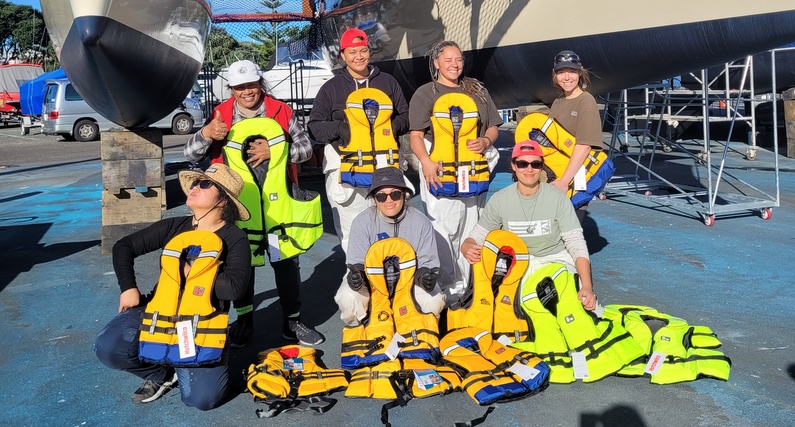
Te Anga Whakamua o Tautiaki Moana
Coastguard’s first Māori and Pasifika Strategy aims to address the inequities highlighted by drowning statistics, to help everyone enjoy New Zealand’s waters safely and with confidence.
Te Anga Whakamua o Tautiaki Moana was launched in 2022, and initiatives under this strategy have already led to a number of successful outcomes and programmes.
The strategy’s six pou (pillars) were developed by Te Pūhara Mana Iwi, Coastguard Tautiaki Moana’s Māori, Pasifika and Asian advisory group. The initiative forms part of the Coastguard's commitment to Wai Ora 2025, New Zealand’s Water Safety Sector Strategy.
Boating Education
Coastguard received Tangata Moana funding from Maritime New Zealand and the NZSAR Council for boating education. This allowed Coastguard to offer their tailored courses to underserved Māori, Pasifika, and Asian communities for free. Covering Day Skipper, In Water Survival, Bar Crossing Safety and Maritime radio courses, they were taught on marae, in churches and community centres. Up to 300 participants per syllabus have attended so far, with 16 Māori and Pacific participants in training to become tutors. Demand for these culturally relevant and accessible courses continues to grow within these communities.
Tongan Boat Safety Challenge
Funded by Foundation North, the challenge used a Tongan worldview to understand and improve the boating practices of Tongan men. This initiative led to seven key insights and three recommendations, which have been implemented in the safety programmes for the Tongan community.
Ngā Hue o Hinemoa
This initiative set up lifejacket hubs in Māori and Pasifika communities. The lifejackets were distributed through Tangata Moana tutors to various cohorts. In Hokianga, a whānau lifejacket hub was set up with 44 lifejackets, including 13 funded by Te Hapu o Ngati Wheke. Raglan hubs were evaluated, resulting in the provision of 65 new lifejackets funded by Waikato Regional Council. Additionally, the Vavau Volunteer Maritime Rescue Association in Tonga received 40 foam lifejackets for their lifejacket loan system.
The Northland Project
A collaboration between Water Safety New Zealand, Surf Life Saving Northern Region, Coastguard, and Northland Māori water safety leaders resulted in three hui being held in Opononi, Whangārei, and Kaitaia. Championed by local community leader Rosina Wikaira, the project identified key challenges and developed actions to address them. It successfully delivered Day Skipper and Boatmaster courses and established a whānau lifejacket hub to enhance water safety in the region. A Hokianga bar seminar is planned for November 7 in Paihia.
Coastguard Taukiaki Moana
In April 2024, Coastguard unveiled its new organisational identity. Tautiaki Moana is the ingoa Māori (name) gifted to Coastguard in 2021 by Ngāti Whakaue, a major hapū of the Te Arawa iwi. The name and new logo were launched alongside a promo campaign to show the public that their role is safety and support, as research showed that many thought Coastguard was there to enforce maritime rules or check on fishing activities. The new identity reminds the public that “Coastguard are for everyone, whatever your waka.”
Learn more at coastguard.nz/about-us/our-journey
Feature image: Ngā Hue o Hinemoa lifejackets presented to Tonga Voyaging Society in Tauranga to deliver to Vava'u Volunteer Maritime Rescue Association, Vava'u, Tonga via a Hinemoana II, double-hulled, ocean-going sailing waka. Courtesy Nātia Tucker.
Enjoy this story?
Sign up to our Link Newsletter to receive stories like this plus NZSAR news and announcements direct to your inbox, every six weeks.
Follow NZSAR on LinkedIn for more SAR news, announcements and discussion.
This story was originally published in the September 2024 issue of Link magazine, which is produced by the NZSAR Secretariat for the wider search and rescue sector.
